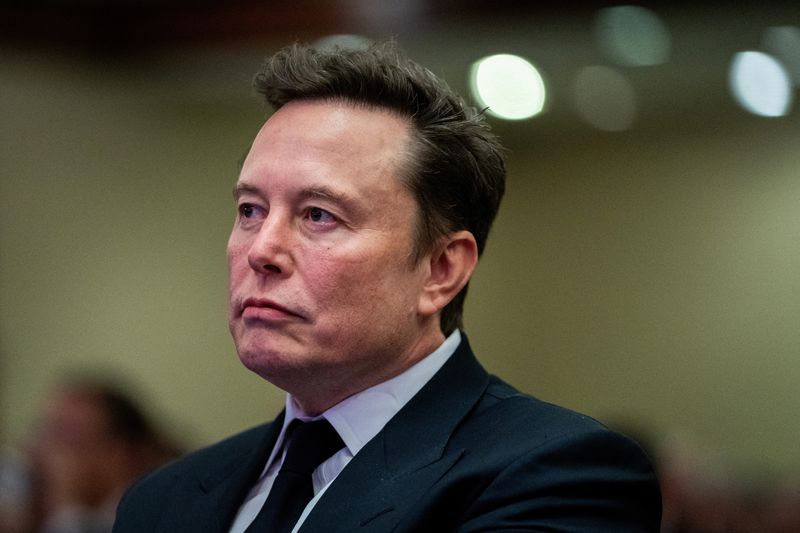(Reuters) – Top executives at many U.S. companies are preparing for the impact from President-elect Donald Trump fulfilling his campaign promise of raising tariffs, a move that could disrupt supply chains and worsen inflationary pressures.
Here is what major companies and C-suite executives have said on tariffs:
Company Commentary
Tesla (NASDAQ:TSLA) July 23 “… It doesn’t make sense to invest a
lot in Mexico if (heavy tariffs are
imposed on vehicles produced in the
country),” said CEO Elon Musk.
Dollar Sept. 4 “… We have long-standing contingency
Tree plans to diversify our supply chain in
a timely and cost-effective manner. We
also have the flexibility to adjust
product specs and price points to
address any changes in the market,”
said Chief Operating Officer Mike
Creedon, who has now become the
interim CEO.
KKR Oct. 24 “We spend most of our time here
focusing on things that we can
control. That’s (tariffs) not one of
them,” said CFO Robert Lewin.
Zebra Oct. 29 “The team is actively working on
Technolo mitigation plans for some of the new
gies tariffs that are coming into place.
And we continue to actively work with
our supply chain partners,” said CFO
Nathan Winters.
Elf Nov. 6 “We certainly have run a number of
beauty scenarios for potential tariffs. It’s
still too early to tell what level
those may come in, but we have a
playbook and we have a number of
levers at our disposal,” said CFO
Mandy Fields.
Axon Nov. 7 “We’ve certainly lived in an
environment of tariffs before. And so
our philosophy is generally to be
pretty flexible,” said CFO Brittany
Bagley.
IFF Nov. 6 “Those tariffs could actually
intuitively be advantageous to our
overall business broadly,” said Chief
Financial and Business Transformation
Officer Glenn Richter.
Under Nov. 7 “It will be interesting to see how
Armour things develop with whether we still
have a split Congress or not,” said
CFO David Bergman.
Steven Nov. 7 “We have been planning for a potential
Madden scenario in which we would have to
move goods out of China more quickly.
We’ve worked hard over a multi-year
period to develop our factory base and
our sourcing capability in alternative
countries like Cambodia, Vietnam,
Mexico, Brazil, et cetera,” said CEO
Edward Rosenfeld.
“You should expect to see the
percentage of goods that we source
from China to begin to come down more
rapidly going forward.”
Tapestry (NYSE:TPR) Nov. 7 “Tariff regime is changing over time.
So, we’re pretty well-versed in
managing through this,” said CFO Scott
Roe.
Home Nov. 12 “… Whatever happens in tariffs will
Depot be an industry-wide impact, it won’t
discriminate against different
retailers and distributors who are
importing goods. The type of product
as an industry is generally sourced
from the named countries,” said CEO
Edward Decker.
“There has been some diversification
of those sources, but clearly a bit of
concentration in Southeast Asia and
China in particular. We source well
more than half of our goods
domestically and in North America, but
there certainly will be an impact.”
Walmart (NYSE:WMT) Nov. 19 “We’re concerned that significantly
increased tariffs could lead to
increased costs for our customers at a
time when they are still feeling the
remnants of inflation,” a Walmart
spokesperson said.
“We never want to raise prices … so
we will work with government officials
and our suppliers to minimize the
impact on our customers.”
Lowe’s (NYSE:LOW) Nov. 19 “Roughly 40% of our cost of goods sold
are sourced outside of the U.S., and
that includes both direct imports and
national brands through our vendor
partners,” said CFO Brandon Sink.
“And as we look at the potential
impacts (of tariffs), it certainly
would add to product costs.”
Williams Nov. 20 “We significantly reduced our China
-Sonoma source goods from 50% to 25% over the
last few years,” said CFO Jeff Howie.
“We are prepared to reduce our
exposure to China further if tariffs
increase … So we’re currently
evaluating quantifying the impact from
additional tariffs.”
Source: Earnings calls

